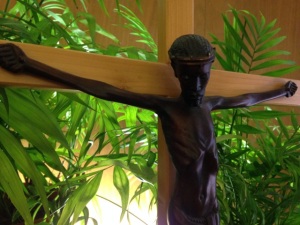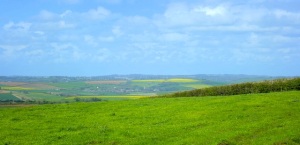Saturday
1 Peter 2
 9But you are a chosen race, a royal priesthood, a holy nation, God’s own people, in order that you may proclaim the mighty acts of him who called you out of darkness into his marvelous light.
9But you are a chosen race, a royal priesthood, a holy nation, God’s own people, in order that you may proclaim the mighty acts of him who called you out of darkness into his marvelous light.
Do words like this get stale? Have they been used so often they lose their power to stir the soul? Do we not understand the grant of honor they contain? Perhaps to people who have much, who have education and income and social standing, who feel in some sense already as if they were people of significance, perhaps to such these words have never echoed with power. But they were not spoken to the elite. They were spoken to the spiritual descendants of that strange collection of Galilean fishermen, tax collectors and women who were not people of significance.
You are a chosen race, a royal priesthood, a holy nation, God’s own people.
Except for Paul, we know of none who were citizens of Rome. Luke, the companion of Paul was a physician. Lydia was a wealthy woman, dealing in purple dyes – but to be in service of the elites of society doesn’t make her one of the elite. The Philippian jailor was a jailor. The Ethiopian Eunuch, for all his high position, was a eunuch, marred in his flesh and ritually unclean for the temple. Samaritans. Gentiles. These were by no means a royal priesthood. But now they are children of God, members of the most noble of all families. Their dishonor had been lifted. Those who were far from God’s holiness had been washed, cleansed, forgiven. They had become a holy people, a people belonging to God.
And they had become a priesthood – a people chosen to represent God in the world.
You are a chosen race, a royal priesthood, a holy nation, God’s own people.
Say it to a member of the urban poor and see if you cannot discover its power. Say it to the old woman in a nursing home. Say it to any of her caretakers dealing with bedpans and bibs. Say it to those weakened by disease or pain. Say it to any with a painful history of addiction. Say it to the castoff family. Say it to the shamed, the discarded, to any whom our society devalues because they are not thin or beautiful or successful.
You are a chosen race, a royal priesthood, a holy nation, God’s own people.
Speak it in the favelas, the Mumbai slums. Say it among the migrant workers. Say it among the sweatshops or on the streets where trafficked children are drugged into despair.
You are a chosen race, a royal priesthood, a holy nation, God’s own people.
Then you will taste the power of the baptismal words that sins have been washed away and you have become a child of God. Then you will feel the shaking earth as the name is given that is above every name. Then you will see the significance of Jesus cradling peasant children and blessing them in the name of the Most High. Then you will understand Mary’s song and the song of Zechariah and the song of Simeon.
You are a chosen race, a royal priesthood, a holy nation, God’s own people.
And then you will understand why the rest of this sentence hardly needs be spoken, for who would fail to share such a treasure?
You are a chosen race, a royal priesthood, a holy nation, God’s own people, in order that you may proclaim the mighty acts of him who called you out of darkness into his marvelous light.
In order that you may proclaim… The honor of heaven is bestowed for a purpose, to carry the word of grace into all creation until all the earth is gathered into the everlasting light of a perfect and holy love.









 when God’s people were good soil, eager for the seed of the word, bearing fruit in every good deed. I know such moments come. I have seen them. In parishes. In myself. A sudden springtime of the soul when I cannot get enough of the word or worship, when I am filled with the wonder and joy, when faith is simple and joyful. Such springtimes do come. Even after long and hard winters. Good Friday always yields to Easter.
when God’s people were good soil, eager for the seed of the word, bearing fruit in every good deed. I know such moments come. I have seen them. In parishes. In myself. A sudden springtime of the soul when I cannot get enough of the word or worship, when I am filled with the wonder and joy, when faith is simple and joyful. Such springtimes do come. Even after long and hard winters. Good Friday always yields to Easter.
